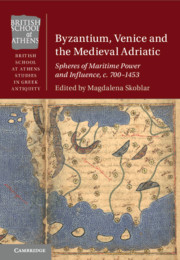Book contents
- Byzantium, Venice and the Medieval Adriatic
- British School at Athens Studies in Greek Antiquity
- Byzantium, Venice and the Medieval Adriatic
- Copyright page
- Contents
- Figures and Maps
- Tables
- Contributors
- Foreword
- Acknowledgements
- Note on Citation, Transliteration, Names, Titles and Dates
- Maps
- Introduction
- 1 The Adriatic Sea 500–1100
- 2 Thinking of Linking
- 3 A Winter Sea?
- 4 The Origins of Venice
- 5 The Northern Adriatic Area between the Eighth and the Ninth Century
- 6 Provincia Iadrensis
- 7 Ravenna and Other Early Rivals of Venice
- 8 Byzantine Apulia
- 9 From One Coast to Another and Beyond
- 10 Icons in the Adriatic before the Sack of Constantinople in 1204
- 11 The Rise of the Adriatic in the Age of the Crusades
- 12 Venice in the Twelfth Century
- 13 Venice, the Ionian Sea and the Southern Adriatic after the Fourth Crusade
- 14 Sea Power and the Evolution of Venetian Crusading
- 15 Reassessing the Venetian Presence in the Late Medieval Eastern Adriatic
- 16 ‘Strangers in the City?’
- Conclusion
- Index
- References
15 - Reassessing the Venetian Presence in the Late Medieval Eastern Adriatic
Published online by Cambridge University Press: 26 March 2021
- Byzantium, Venice and the Medieval Adriatic
- British School at Athens Studies in Greek Antiquity
- Byzantium, Venice and the Medieval Adriatic
- Copyright page
- Contents
- Figures and Maps
- Tables
- Contributors
- Foreword
- Acknowledgements
- Note on Citation, Transliteration, Names, Titles and Dates
- Maps
- Introduction
- 1 The Adriatic Sea 500–1100
- 2 Thinking of Linking
- 3 A Winter Sea?
- 4 The Origins of Venice
- 5 The Northern Adriatic Area between the Eighth and the Ninth Century
- 6 Provincia Iadrensis
- 7 Ravenna and Other Early Rivals of Venice
- 8 Byzantine Apulia
- 9 From One Coast to Another and Beyond
- 10 Icons in the Adriatic before the Sack of Constantinople in 1204
- 11 The Rise of the Adriatic in the Age of the Crusades
- 12 Venice in the Twelfth Century
- 13 Venice, the Ionian Sea and the Southern Adriatic after the Fourth Crusade
- 14 Sea Power and the Evolution of Venetian Crusading
- 15 Reassessing the Venetian Presence in the Late Medieval Eastern Adriatic
- 16 ‘Strangers in the City?’
- Conclusion
- Index
- References
Summary
The fifteenth century was decisive for establishing Venetian rule along the Eastern coast of the Adriatic. For decades, historiography on the topic has been rather fragmented between national historiographies that barely examined the region as a whole and a few scattered attempts at international Mediterranean studies. This essay seeks to reflect recent discussions on Venetian statehood and current research in Croatian and Albanian historiography.
Keywords
- Type
- Chapter
- Information
- Byzantium, Venice and the Medieval AdriaticSpheres of Maritime Power and Influence, c. 700-1453, pp. 351 - 364Publisher: Cambridge University PressPrint publication year: 2021

